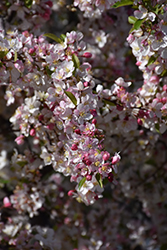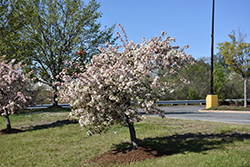Fri & Sat 8am - 8pm
Sun 8am - 7pm
Anytown, USA 12345
fax: 261.787.0463
e-mail: info@successgc.com


Plant Finder

Candymint Flowering Crab
Malus sargentii 'Candymint'
Height: 10 feet
Spread: 15 feet
Sunlight:
![]()
Hardiness Zone: 4a
Other Names: Sargent's Flowering Crab, Roseybloom Crabapple
Description:
A beautiful ornamental by all accounts with its wide-spreading horizontal branching, sweet pink flowers, deep purple fruit which persist into winter, and showy rich purple leaves; excellent choice for a garden accent
Ornamental Features
Candymint Flowering Crab is smothered in stunning clusters of fragrant pink flowers with shell pink overtones and rose edges along the branches in mid spring before the leaves. It has attractive deep purple deciduous foliage which emerges dark green in spring. The pointy leaves are highly ornamental and turn yellow in fall. The fruits are showy deep purple pomes carried in abundance from early to mid fall. The smooth brown bark and brick red branches add an interesting dimension to the landscape.
Landscape Attributes
Candymint Flowering Crab is a spreading deciduous shrub with a stunning habit of growth which features almost oriental horizontally-tiered branches. Its relatively fine texture sets it apart from other landscape plants with less refined foliage.
This is a relatively low maintenance shrub, and is best pruned in late winter once the threat of extreme cold has passed. It has no significant negative characteristics.
Candymint Flowering Crab is recommended for the following landscape applications;
- Accent
- General Garden Use
Planting & Growing
Candymint Flowering Crab will grow to be about 10 feet tall at maturity, with a spread of 15 feet. It has a low canopy with a typical clearance of 2 feet from the ground, and is suitable for planting under power lines. It grows at a medium rate, and under ideal conditions can be expected to live for 40 years or more.
This shrub should only be grown in full sunlight. It prefers to grow in average to moist conditions, and shouldn't be allowed to dry out. It is not particular as to soil type or pH. It is highly tolerant of urban pollution and will even thrive in inner city environments. This is a selected variety of a species not originally from North America.

